Only Thing Worse Than Iran Now Is Iran With Nukes – Biden
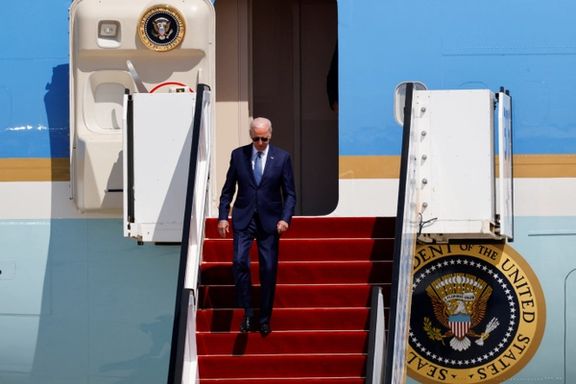
US President Joe Biden reiterated upon arrival in Israel on Wednesday that the only thing worse than Iran now is an Iran with nuclear weapons.”

US President Joe Biden reiterated upon arrival in Israel on Wednesday that the only thing worse than Iran now is an Iran with nuclear weapons.”
Biden told Israel’s Channel 12 that he still believes the US should return to the 2015 nuclear deal – formally known as the Joint Comprehensive Plan of Action (JCPOA), noting that the decision is now in Iran’s hands.
About whether the US would use force to stop Iran from attaining a nuclear weapon, Biden said "as a last resort, yes."
He, however, once again rejected Iran’s demand that the Revolutionary Guards (IRGC) be taken off Washington’s list of foreign terrorist organizations as part of any agreement. Asked if he would hold to that position even if it meant no deal, Biden said, “Yes.”
Israel was a staunch opponent of the 2015 nuclear deal and welcomed then-President Donald Trump’s decision to unilaterally withdraw from it, which led to its unraveling, a decision Biden calls a “gigantic mistake” that accelerated Iran’s progress towards a nuclear weapon.
He declined to comment on any discussions with Israel about using military force against Iran, but assured Jerusalem that he will work with whomever is elected as Israel’s next prime minister, even Benjamin Netanyahu, with whom he has had strained relations. “We’re committed to the state, not an individual leader.”
“In order to stop regimes like Iran, economic sanctions are not enough, diplomatic sanctions are not enough. There is no way to stop Iran without a credible military threat,” said Netanyahu, who was not part of the official greeting ceremony for the US president but did shake his hand.

As President Joe Biden arrived in Israel Wednesday, he did not rule out the use of force as a last resort to prevent Iran from building nuclear weapons.
However, in the bigger scheme of politics in the volatile region, analysts disagreed over whether his Mid East tour was a move to reshape regional politics or a doomed exercise to keep down oil prices.
Ahead of Biden reaching an Arab summit Friday in Saudi Arabia, Sheikh Mohammed bin Zayed al-Nahyan, president of the United Arab Emirates, said in a televised address Wednesday that the UAE would extend a “hand of friendship” to all countries seeking peaceful coexistence.
Friday’s meeting of the six-country Gulf Cooperation Council, Egypt, Iraq, and Jordan has been widely billed as a means to take forward shared air-defense measures between Gulf Arab states, Israel, and the US to counter any threat from Iranian or Iranian-supplied missiles and drones. Biden also told Israeli Channel 12 that the US would if needs be use force to preclude Iran developing a nuclear weapon.
The statement underlined the dimmer prospects of an agreement to revive the 2015 nuclear deal, and a tougher posture by Biden.
Incremental measures are also expected between Saudi Arabia and Israel, including overflight rights but stopping short of Israel’s ‘normalization’ agreements with the UAE and Bahrain brokered by the Trump administration in 2020. Saudi Arabia has so far upheld Arab League policy, dating to 2002, that normalization required Israeli acceptance of a viable Palestinian state.
American media meanwhile are interested in whether Biden can persuade the Saudis to pump more oil and ease inflationary pressure at US gas stations currently selling at near $5 a barrel.
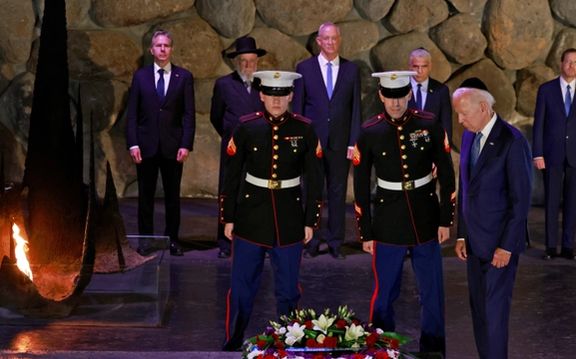
Arriving at Ben Gurion Airport, Biden bumped fists with Israeli caretaker Prime Minister Yair Lapid and proclaimed, “not all Zionists are Jews.” Arguing the visit flew in the face of Palestinian rights despite Biden’s formal commitment to a “two state” future, Wasel Abu Youssef, an executive member of the Palestine Liberation Organization (PLO), said the trip aimed at “integrating the occupation state in the Arab region and…[building] a new alliance against Iran.”
‘Decisive response’
Iranian President Ebrahim Raisi was reported to tell the cabinet Wednesday that Iran was “watching the region closely” as Biden’s trip developed.
“If the American officials’ visits to the regional states are aimed at strengthening the position of the Zionist regime and normalizing its relations with certain countries, their efforts will not in any way bring about security for the Zionists,” Raisi said. “Tehran has repeatedly told those who convey US messages to Iran that the slightest move against Iran’s territorial integrity will face a decisive response.”
In a Washington Post opinion piece ahead of his visit headlined ‘Why I’m Going to Saudi Arabia,’ Biden suggested he wanted human rights upheld in the Middle East and any US combat role ended. He claimed that the “frequency of Iranian-sponsored attacks compared with two years ago” had “dropped precipitously” and that the region was less pressurized, partly due to Iraq mediating between Iran and Saudi Arabia.
‘Zero-sum diplomacy’
The build-up to Biden’s trip has seen widely different assessments by analysts. Criticizing the president, Daniel Levy, president of the US Middle East Project and a senior advisor in the prime minister’s office under Ehud Barak (1999-2000), accused Biden of “jumping on the normalization bandwagon.” Writing on the Responsible Statecraft website July 12, Levy said Biden was working to “give Israel a freer hand in trampling Palestinian rights and to advance a militarist zero-sum approach to regional ‘diplomacy’.”
By contrast, Hussein Ibish of the Arab Gulf States Institute, wrote July 11 for Bloomberg that Biden wanted extend to the Middle East his “success in reunifying and revitalizing the alliance of Western democracies..[by giving] Washington its most dynamic international leadership role in decades.”
Ibish urged Biden to offer the Saudis “some carrots, mostly in terms of military hardware,” while working to “reinforce the primacy of countering Iran,” while the Saudis “seriously undertake aiding the US to manage energy pricing, beyond the modest production increases reached by the Organization of the Petroleum Exporting Countries…”
In the Middle East, Ibish wrote, “the common adversary is Iran, not Russia…” All six Arab states at Friday’s summit should acknowledge they are “best protected through a US-led grouping aimed at maintaining regional order and stability, to which they can each contribute and from which they will all benefit.”
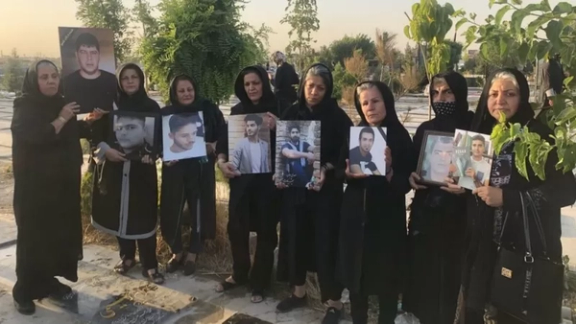
The United Nations office of Human Rights has expressed concerns about Iran’s recent detention of film directors, civil society activists and family members of victims of human rights violations.
The Office of the High Commissioner for Human Rights (OHCHR) told Iran International on Wednesday, “So far in July, over 13 people have been arrested... We note with concern the continued crackdown against civil society actors and their fundamental rights in Iran.”
“We are particularly concerned that detentions are being made on the basis of overbroad national security and espionage charges, which would render them arbitrary under international human rights law,” the office said in response to Iran International’s Maryam Rahmati.
“Civic and democratic space continue to be restricted, with human rights defenders and civil society actors operating within a coercive environment where violations are committed with impunity,” the OHCHR said, referring to the latest report by UN Secretary General António Guterres on the human rights situation in Iran presented to the Human Rights Council on 21 June.
Also on Wednesday, the US State Department’s Bureau of Democracy, Human Rights, and Labor condemned the increasing arrests of rights activists by the Islamic Republic, saying “The recent arrests in Iran are a reprehensible crackdown on peaceful dissent, including against political activists, filmmakers, and brave women protesting mandatory hijab laws. The United States condemns Iran’s continued efforts to prevent the exercise of freedom of expression.”
Earlier in the day, Iran’s government and military officials warned the population over disobeying hijab rules, one day after many women took off their headscarves in public.
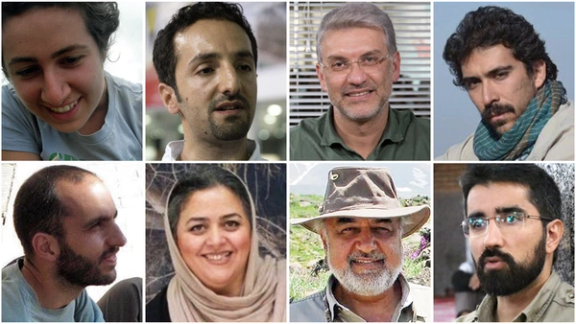
About 2,800 environment protection academics, lawyers and artists have written to Iran’s chief justice, asking him to reconsider the case against a group of environmentalists detained since 2018.
In their letter to Gholamhossein Mohseni Ejei, the public figures and civil society actors said that given the replacement of the Revolutionary Guard (IRGC) Intelligence Organization Chief Hossein Taeb, their cases should be reviewed and called on him to consider the legal possibilities of a parole for them.
The signatories emphasized that the four-member committee of the former administration to examine the issue, comprised of ministers of interior, intelligence and justice as well as the legal advisor to the president, had found no evidence to prove charges of espionage against them.
Nine environmentalists and ecologists were arrested in 2018 on charges of espionage. All were members of the Persian World Heritage Foundation, an NGO dedicated to conserving wildlife in Iran, and are serving sentences from four to 10 years. Kavous Seyed-Emami, the NGO’s founder, was found dead in his cell two weeks after his detention, with the authorities reporting suicide and the family denying the claim.
Human Rights Watch has reported the detainees have been subject to ‘torture’ during incarceration, and that no evidence of any crime has been produced in public, with convictions obtained in special security courts.
Iran International published a compilation of four investigative reports on torture and abuse of these prisoners on June 21.
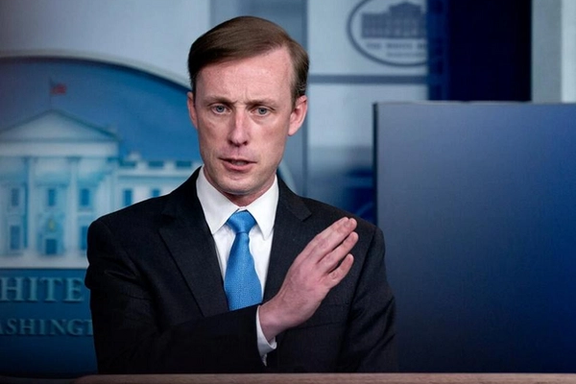
US National Security Adviser Jake Sullivan Wednesday warned of the threat of Russian President Vladimir Putin's attempts to deepen relations with Iran to could harm Ukrainian civilians.
Sullivan made the remarks from Air Force One as President Joe Biden embarked on his tour to the Middle East.
"Russia deepening an alliance with Iran to kill Ukrainians is something that the whole world should look at and see as a profound threat," Sullivan said.
His comments come as US officials have said Iran is preparing to help supply Russia with several hundred drones, including some that are weapons-capable, to use in Ukraine, while Putin is expected to visit Tehran next week. Sullivan called the timing of the Putin trip "interesting."
An official of Ukrainian President Volodymyr Zelenskyy’s political party told Iran International on July 12 that the news of Tehran planning to arm Russia with drones has shocked Ukrainian officials.
Yevheniia Kravchuk, who is also a member of the Ukrainian parliament, said that Tehran’s decision would lead to the death of more Ukrainian civilians.
Sullivan said on July 11 that “Our information indicates that the Iranian government is preparing to provide Russia with up to several hundred UAVs, including weapons-capable UAVs on an expedited timeline,” adding that Iran is “preparing to train Russian forces to use these UAVs with initial training sessions slated to begin as soon as early July.”
Tehran has not officially taken side with Russia on Ukraine but many officials, including President Ebrahim Raisi, have implicitly accused Ukraine of instigating Russia to attack by seeking to join NATO.
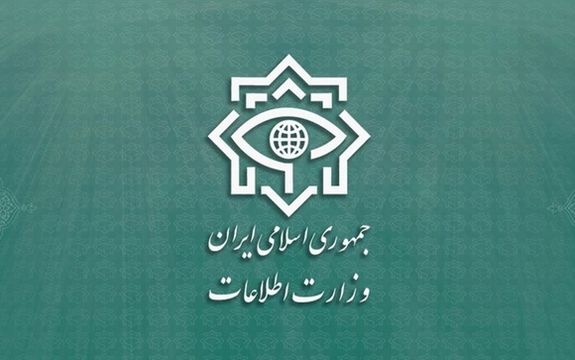
Iran’s Intelligence Ministry says it has arrested 10 armed members of a Kurdish separatist group in northwestern parts of the country, calling them part of “a terrorist network.”
In a statement on Wednesday, the ministry claimed they had plans to attack Iran’s vital economic centers and facilities.
The group was comprised of several cells with various missions to destroy vital facilities of the country, to create roadblocks and extort money from the people, especially successful local entrepreneurs, the ministry claimed.
Describing the report as "fake news," Kaveh Bahrami, the head of armed wing of Democratic Party of Iranian Kurdistan called it an attempt to justify an “atmosphere of pressure, threats and more executions".
The network had entered the country through the border areas of West Azarbaijan province with the support of terrorist groups in the Kurdistan region of Iraq, read the statement, adding that advanced communication technology and weapons, including various types of guns, rocket-propelled grenades, hand grenades, explosives and ammunition have been discovered and confiscated from the group.
A Kurdish rights group said on July 8 that at least four servicemen of Iran’s Revolutionary Guard were killed in clashes with fighters of the Kurdistan Workers' Party in the province.
The Islamic Republic calls the Kurdish armed groups in the western provinces of Iran, "terrorist groups" or "anti-revolutionary" but these groups say that the goal of their armed campaign is "defending the rights of the Kurds".
Generally, the Kurdish parties − including Komala and the Kurdistan Democratic Party of Iran (KDPI) − favor Kurdish autonomy within a federal Iran. Pejak (the Free Life Party of Kurdistan), an affiliate of the Kurdistan Workers Party (PKK), formed in Turkey but also based in northern Iraq, has generally favored a unified, independent Kurdistan uniting Kurds in Syria, Iraq, Turkey, and Iran.